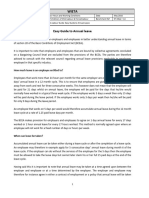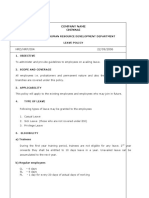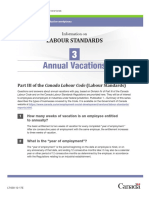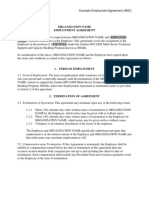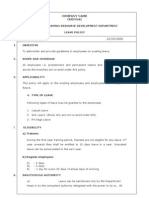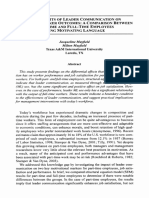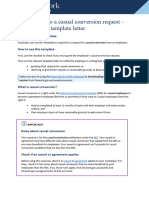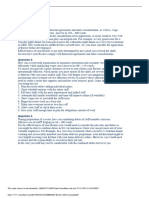Leave Policy
Leave Policy
Uploaded by
havocbahCopyright:
Available Formats
Leave Policy
Leave Policy
Uploaded by
havocbahOriginal Title
Copyright
Available Formats
Share this document
Did you find this document useful?
Is this content inappropriate?
Copyright:
Available Formats
Leave Policy
Leave Policy
Uploaded by
havocbahCopyright:
Available Formats
TRUST POLICY
LEAVE
This document may be made available to the public and persons outside of the Trust as part of the Trust's compliance
with the Freedom of Information Act 2000.
Please be aware that only documents downloaded or viewed directly from the GHNHST Trust Policies webpage are valid
documents. Documents obtained through printed copies or internet searches may be out of date and therefore will be
invalid.
In this document you may find links to external websites. Although we make every effort to ensure these links are
accurate, up to date and relevant, Gloucester Hospitals NHS Trust cannot take responsibility for pages maintained by
external providers.
FOR USE BY:
This document is to be followed by all staff of Gloucestershire Hospitals NHS Trust and
Gloucestershire Managed Services
FAST FIND:
Section 6 - for annual leave entitlements
Section 9 - contains information on Bank Holiday entitlements
Section 10 - for information on carrying leave over
Section 14 - for details other types of leave which employees may be entitled to in certain
circumstances
AC1 Annual Leave - Buying and Selling
AC2 Parental Leave
Time off for Trade Union Leave – Please see the Facilities Agreement
B0286 – LEAVE V5 PAGE 1 OF 9
ISSUE DATE: JUNE 2020 REVIEW DATE: JUNE 2023
1. INTRODUCTION / RATIONALE
Leave from work is an important element of work-life balance and the health and wellbeing of
employees; it can span a number of different circumstances. This policy establishes a clear
framework for the management of annual leave and other types of leave within the Trust.
2. DEFINITIONS
Word/Term Descriptor
Bereavement leave Previously known as compassionate leave.
Designated days 24-hour period, usually a Monday or Tuesday allocated as Bank Holiday time when a Bank
Holiday falls on a Saturday or Sunday.
3. POLICY STATEMENT
This document lays out the basic conditions for leave entitlements. It must be read in conjunction
with any departmental procedures for booking and agreeing leave, and also the annual leave
resources on the HR Intranet site.
4. ROLES AND RESPONSIBILITIES
Post/Group Details
Managers Ensuring maximum efficiency of service delivery when organising leave
Ensuring that employees take leave appropriately and at reasonable intervals
Considering all leave requests in a fair and consistent manner (including
religious/cultural considerations)
Considering short-notice requests for annual leave
Employees Ensuring leave is requested with reasonable notice and in accordance with any
departmental procedures
Ensuring all leave is appropriately authorised in advance
Working with managers to ensure that own needs for leave are balanced with the needs
of the service
5. ANNUAL LEAVE YEAR
The annual leave year normally runs from 1st of April to 31st March. However, local agreements
may be made to adjust the standard leave year provided that staff are fully consulted with prior to
implementation. Options include:
Uniform leave year for all, but starting on a different date (e.g. 1st January – 31st December)
Individual leave year starting from date of appointment or from an individual’s birthday
Managers are encouraged to consider flexible adjustments to the standard annual leave year where
it eases bulk requests at the end of the financial year.
6. ANNUAL LEAVE ENTITLEMENT
Annual leave is normally calculated according to a standard entitlement. Certain exceptions are
detailed below. Contact a Human Resources advisor for guidance on implementing term-time and
annualised/seasonal contracts, or making any variations to these. This policy does not cover these
aspects.
6.1 Standard Entitlement
The table on the next page details entitlement for a standard working pattern for full/part time staff
who work regular shift patterns/hours over a five-day week. Leave entitlements also increase with
long service to the NHS.
B0286 – LEAVE V5 PAGE 2 OF 9
ISSUE DATE: JUNE 2020 REVIEW DATE: JUNE 2023
Where an employee works a variety of shift patterns, or work different hours on different days,
annual leave entitlement should be calculated on the basis of hours worked to ensure consistency
when deducting leave.
Length of Service Inclusive leave entitlement*
On appointment to NHS 35 days† (27 days + 8 Bank Holidays)
After 5 years’ service 37 days (29 days + 8 Bank Holidays)
After 10 years’ service 41 days (33 days + 8 Bank Holidays)
*N.B. Pro-rata for part time staff. For further information on calculating leave entitlements, please refer to the HR
Intranet site
†Annual leave may also be calculated in hours for some staff.
6.2 Entitlement on Joining/Leaving the Service
Annual leave in the first year of employment will be pro-rata based on the number of complete
months worked after the date of joining and before the end of the annual leave year, e.g. an
employee joining the service on 1st October would receive half of the annual entitlement.
Employees whose employment contract is terminated part way through the annual leave year will
be entitled to a proportion of annual leave for each complete month worked in the current leave
year.
Payment will be made for any outstanding annual leave, as detailed and authorised by the
responsible manager on the employee’s Leavers Form. Where an employee has exceeded their
entitlement at the point of termination, an appropriate deduction will be made from the employee’s
final salary payment.
6.3 Term-time Contracts
Where an employee has a term-time contract, it is normally expected that all their leave will be
taken during school holiday periods. Term-time contracts are worked out individually and the timing
and duration of holiday periods form part of the contract of employment. Term time contracts will
also be reviewed at reasonable intervals to ensure fairness and consistency to other members of
staff in the area with childcare needs.
Salary is paid in equal instalments so that the leave component of the pay is equally divided across
the year.
6.4 Annualised Hours
Where an employee’s hours are calculated on an annual or seasonal basis, there may be a large
variation on the weekly/monthly/quarterly hours worked.
Annual leave entitlements for employees on this type of contract are usually calculated in hours.
6.5 Recording
Managers are responsible for ensuring that leave is appropriately recorded. Many areas will have
their own annual leave forms, such as the one used by Nursing: Nursing Leave Form.
6.6 Death in Service
Where an employee dies in service, the balance of annual leave remaining at the time of death will
be paid to the employee’s next of kin or person taking charge of the deceased employee’s estate.
Please refer to the B0617 Death in Service Action Card.
B0286 – LEAVE V5 PAGE 3 OF 9
ISSUE DATE: JUNE 2020 REVIEW DATE: JUNE 2023
7. MANAGEMENT OF ANNUAL LEAVE
All line managers must ensure the following:
That all staff take the statutory annual leave allowance (i.e. 20 days, not counting bank
holidays)
That their staff manage their own annual leave appropriately, e.g. spacing it throughout the
leave year
That when planning staff leave for their own area, they take into account that any member of
staff will be absent for 17% of the time (annual leave + bank holidays – this does not account for
any sick leave)
8. CALCULATION OF NHS SERVICE
8.1 Previous Service
All previous NHS service (with NHS Trusts or Health Authorities) will be taken into account when
calculating entitlements to annual leave and some other types of leave (see section 13 below).
It does not normally include working within the NHS for another employer, such as GP practice or
contractor.
8.2 Verifying Service
The Trust will verify previous NHS service if possible, by contacting pervious employers or using the
NHS Pensions database. In circumstances where it is not possible for the Trust to confirm all NHS
service, the employee will be required to provide evidence, which could include:
Pay slips or P60 from previous NHS employer(s)
NHS Pensions membership statement
Nurse training and bank work does not count as previous service unless the employee was directly
employed by an NHS employer for the duration of their training.
9. BANK HOLIDAYS
9.1 Designated Days
The total leave entitlement includes eight Bank holidays. Where a Bank Holiday falls on a
Saturday or Sunday, the following Monday or Tuesday is designated as a Bank Holiday. Where
more than eight Bank Holidays fall in one leave year, departmental managers will make a
decision as to whether the extra day(s) will be added to the entitlement, or whether employees
will need to borrow leave from the next leave year.
Requirement to work Bank Holidays is determined by contractual arrangements and service
need. Employees required to work a Bank Holiday as part of their normal working week will take
an annual leave day at another time, which will be deducted from the total entitlement.
If all contractual hours are worked during the week of a bank holiday (i.e. the bank holiday falls
on a rest day), it will not be deducted and may be taken at another time.
Employees who wish to work a Bank Holiday when not required to should approach their
manager, who may authorise this subject to service requirements.
9.2 Part Time Employees
Employees contracted to work on a part-time basis are entitled to a pro-rata Bank Holiday
entitlement based on the standard eight days.
B0286 – LEAVE V5 PAGE 4 OF 9
ISSUE DATE: JUNE 2020 REVIEW DATE: JUNE 2023
10. CARRYING LEAVE OVER
Employees are responsible for ensuring that they take their annual leave during the designated
leave year. Up to three working days (maximum 22.5 hours) for full-time employees (pro-rata for
part-time employees) may be carried over to the following year by agreement with line manager.
Carried over leave should normally be taken within the first three months of the start of the new
leave year. Managers must consider employees’ requests sensitively and not place
blanket bans on carry-over of leave unless there is a genuine risk to service provision.
In accordance with the Trust’s Flexible Working Policy, it may be appropriate to allow leave
carry-over on an occasional basis for individuals with a particular request, such as an extended
holiday.
It is important to ensure that any authorisation of extended carry over of leave is compliant with
the Working Time Directive minimum of 5.6 weeks per working year.
Carry over provisions may change in light of exceptional circumstances e.g. Pandemics.
New temporary statutory rules introduced by the government to deal with COVID-19 pressures
mean that employees who are unable to take their annual leave entitlement due to COVID-19,
can carry over up to 20 days (pro-rated for part-time staff) of annual leave over a two year
period. However:
o if employees cannot take bank holidays off due to COVID-19, they should use the annual
leave at a later date in their leave year
o if this is not possible, bank holidays can be included in the 20 days’ annual leave that
can be carried over. This holiday can be taken at any time over a two-year period.
11. SICKNESS DURING ANNUAL LEAVE
Annual leave will be re-added to the employee’s entitlement if an employee is sick whilst on annual
leave and a medical certificate is provided. This does not apply to sickness during Bank Holidays.
Phased returns to work may involve use of carried over leave as part of the rehabilitation plan. This
will be agreed on a case-by-case basis with the manager and HR. Please refer to the Sickness
Management Policy for full details of this arrangement
12. EXTENDED ANNUAL LEAVE
Line managers are responsible for agreeing periods of extended leave with employees, which
may be a combination of paid and unpaid leave depending on the amount of leave remaining for
that year.
Requests should not be unreasonably refused by the manager and will be dependent upon
service requirements. Consideration must be given to ensuring that the employee has adequate
rest periods for the rest of that leave year.
Longer periods of leave (more than three months) can be considered under the Trust’s Career
Break Policy.
13. ANNUAL LEAVE BUYING AND SELLING
Employees may buy or sell annual leave, subject to management approval in line with the
parameters outlined in the scheme guidelines. See AC1 for details of the process.
All requests to sell annual leave must meet all the criteria as set out in action card LEA1 and must
be submitted on the relevant form (See RD3) for approval by an Executive Director.
All requests to purchase annual leave must be made on the appropriate form (See RD2).
To deal with operational pressures, a manager may request that an individual sell up to one week of
their annual leave (subject to having taken the minimum statutory leave). However, an individual
may reasonably refuse this request.
B0286 – LEAVE V5 PAGE 5 OF 9
ISSUE DATE: JUNE 2020 REVIEW DATE: JUNE 2023
14. OTHER TYPES OF LEAVE
14.1 Types of Leave Available
A range of other types of leave are available to Trust employees in certain circumstances.
These are:
o Time off for interviews – see 14.2 below
o Time off for Jury Service/court attendance as a witness – see 14.3 below
o Time off for civic and public duties – see 14.4 below
o Time off for reservists – see 14.5 below and the Armed Forces Reservists procedure
o Time off for a Special Constable – see 14.6 below
o Time off for medical/dental appointments – see 14.7 below
o Time off for emergencies (including domestic/carer needs) – see 14.8 below
o Time off for bereavement – see 14.9 below
o Time off during adverse weather conditions – see 14.10 below
o Time off for trade union activities – see the Facilities Agreement
In all cases, if line managers feel that they will have problems accommodating any request for
another type of leave, or the employee’s absence will cause service delivery problems, contact
the HR department in the first instance.
Long term leave can be requested in the form of a sabbatical or career break. See the Career
Break procedure for details.
14.2 Time Off for Interviews
Managers are entitled to ask for evidence of the interview before granting any request for time
off
Employees are allowed reasonable paid time off to attend NHS interviews, taking into account
any travelling time needed and other time off given for interviews in the last 12 months
Employees wishing to attend an interview for a non-NHS post must take annual leave or attend
outside their working hours
Any employee who has worked at the Trust for more than two years and has been placed at risk
of redundancy is legally entitled to time off to look for another job, or arrange training for future
employment.
14.3 Time Off for Jury Service/Attendance at Court as a Witness
Employees must give their line manager a copy of the request from the court as soon as they
receive it, so that arrangements can be made to cover their work
Reasonable paid time off will be paid by the Trust for jury service. Employees are expected to
contact their line manager if they are released early whilst on jury service in case they are
needed at work, or if they are allocated to a lengthy case which will take them over the
“standard” period of service, which is usually two weeks. Requests for carry over of leave will
also be looked at sympathetically where an employee is on a lengthy period of jury service
which runs across the end of the annual leave year
Employees on jury service cannot claim their pay back from the court, but are entitled to claim
other reasonable expenses
Reasonable time off with pay will be made for attendance at court as a witness if it relates to
Trust business – see the Medical Staff Handbook for those who have to attend court in medico-
legal cases
Employees are usually expected to take annual leave to attend court if it is not related to Trust
business – contact the HR department for advice.
B0286 – LEAVE V5 PAGE 6 OF 9
ISSUE DATE: JUNE 2020 REVIEW DATE: JUNE 2023
14.4 Time Off for Civic or Public Duties
Civic or public duties include service to local or national government, as service as a magistrate or
prison visitor.
Employees are allowed reasonable time off to undertake civic or public duties. A maximum of
18 days per year may be taken in negotiation with the line manager, of which 5 days will be
paid.
The Trust will reclaim the cost of the employee’s time back from the organisation (e.g. County
Court, Prison Service) where this is possible – employees may not be paid twice and must
declare to the Trust if they receive payment from the organisation
Line managers are entitled to ask for evidence from the employee before considering the
request
Line managers must consider the request in the context of their own service and the effects that
the employee’s absence would have upon it on a regular basis.
14.5 Time Off as an Armed Forces Reserve
See the Armed Forces Reserves Procedure.
Trust employee who are reserves and are mobilised across the end of an annual leave year may
carry over any outstanding statutory leave into the next annual leave year.
14.6 Time Off as a Special Constable
Trust employees who are special constables are entitled to up to two days paid leave per year to
support training. The Trust reserves the right to restrict this to maintain service provision.
14.7 Time Off for Medical/Dental Appointments
Employees are encouraged to schedule medical/dental appointments outside their normal
working hours or at the beginning or end of the day. The Trust recognises that it is often not
possible to request specific time for appointments. In such cases, employees are required to
work the time back or consider other arrangements such as unpaid leave, use of annual leave or
TOIL.
Employees should give their line manager as much notice as possible of appointments.
If an employee is unfit to work before or after the appointment, line managers must record this
time as sick leave.
Any time off for diagnostic tests requiring admission to hospital will be recorded as sick leave.
Managers should ensure that appropriate reasonable adjustments are made to duties and
working environment where this is appropriate and practical in line with Trust Guidance –
Guidance for Managers
Please refer to the Maternity, Adoption and Parental leave policy for information regarding time
off for antenatal or postnatal appointments.
14.8 Time Off for Emergencies
This covers unforeseen domestic emergencies that require the immediate attendance of the
employee, and may include emergencies with dependants (spouse, child or parent), or for domestic
emergencies such as fire or robbery in the employee’s own home.
Employees can only take one day’s leave for each emergency situation, and emergency leave
may be granted up to twice in any one leave year.
Leave is granted to enable the employee to attend to the emergency and put in any necessary
ongoing arrangements such as alternative care.
Emergency leave is separate to annual leave and therefore this time off should not be deducted
from an employee’s annual leave entitlement.
B0286 – LEAVE V5 PAGE 7 OF 9
ISSUE DATE: JUNE 2020 REVIEW DATE: JUNE 2023
Depending on the circumstances and any frequency of requests for emergency leave managers
may consider other options in addition/instead of granting paid leave, these may include unpaid
leave, use of annual leave or TOIL, change of shift pattern.
14.9 Bereavement Leave
Managers may grant paid leave up to a maximum of one working week for employees who have
suffered the bereavement of a close family member or in the event of someone who is not a
family member subject to management discretion. Situations like this must be considered on a
case by case basis. In the case of the bereavement of a child or the employee suffers a stillbirth
from 24 weeks of pregnancy, Managers may grant paid leave up to a maximum of two weeks for
employees. This leave must be taken within 56 weeks following the death of a child.
Employees are encouraged to raise any concerns regarding this leave with their line manager
and seek their guidance if additional leave is required.
Pay for bereavement leave will be calculated based on the three months prior to the first day of
leave.
14.10 Time off During Adverse Weather Conditions
Line managers must use discretion and knowledge of local circumstances in the event of severe
weather conditions. The following will apply:
Employees who attend work will be treated as being present for their full working day, whether
or not they have been able to attend for the full period
Employees may request to work at another NHS hospital/facility, take annual leave, or make
other arrangements with their line manager. They will receive full pay in these circumstances.
Managers may consider the option of working from home and should seek guidance from the
Trust’s Working from Home Policy
15. LEAVE DISPUTES
Employees have recourse to the Trust’s Grievance Policy if leave is unreasonably turned down.
16. TRAINING
There is no formal training for this policy; information on its use is available from the HR department.
17. MONITORING OF COMPLIANCE
Do the systems or processes in this document have to be monitored in line with national, regional or
NO
Trust requirements?
18. REFERENCES
None
B0286 – LEAVE V5 PAGE 8 OF 9
ISSUE DATE: JUNE 2020 REVIEW DATE: JUNE 2023
DOCUMENT PROFILE
Reference Number B0286
Title Leave
Category Non-Clinical
Version V5
Issue Date June 2020
Review Date June 2023
Owning Division Corporate
Owning Specialty Human Resources
Associated Specialities N/A
For Use By GHNHST & GMS STAFF
Author Bilal Pandore, HR Manager
Quality Assurance Group Human Resources Policy Group (HRPG)
Other Approving Groups N/A
Local Approval Details HRPG on 3rd June 2020
TPAG Ratification E-Approved 22/06/2020
Consultees HR Policy Group, Joint Negotiation Committee, Divisional Managers, HR team, staff side
Dissemination Details Upload to Policy Site; cascaded via divisions
Keywords Leave, Entitlement, Annual Leave, Other Types of Leave
Equality Impact Assessment (EIA) B0286 EIA
Related Trust Documents AC1 Annual Leave - Buying and Selling
AC2 Parental Leave
Career Break Procedure
Other Relevant Documents Flexible Working Policy;
Maternity, Paternity and Adoption Leave Policy;
Sickness Management Policy;
Grievance Policy
Career Break Procedure
External Compliance Standards N/A
and/or Legislation
B0286 – LEAVE V5 PAGE 9 OF 9
ISSUE DATE: JUNE 2020 REVIEW DATE: JUNE 2023
You might also like
- Topic 3 - Employment and Work FuturesDocument81 pagesTopic 3 - Employment and Work FuturesDK01No ratings yet
- Hudson The Case For Work Life BalanceDocument39 pagesHudson The Case For Work Life BalanceGABRIEL ELLISENo ratings yet
- Offer LetterDocument14 pagesOffer LetterPramod KumarNo ratings yet
- CX COS18 Employee Handbook (Rev 9)Document25 pagesCX COS18 Employee Handbook (Rev 9)Tim RolandNo ratings yet
- CG16 - 18 Employment ContractsDocument4 pagesCG16 - 18 Employment ContractsArdamitNo ratings yet
- Leave Policy: Hafsa Shafiq (COMPANY NAME) (Company Address)Document6 pagesLeave Policy: Hafsa Shafiq (COMPANY NAME) (Company Address)hafsaNo ratings yet
- PhleaveDocument197 pagesPhleaveapi-3770073No ratings yet
- Dla Tmp7e84Document20 pagesDla Tmp7e84Hawta RamadanNo ratings yet
- Annual Leave PolicyDocument10 pagesAnnual Leave PolicyNeerajNo ratings yet
- Annual Leave Policy 2022 1Document3 pagesAnnual Leave Policy 2022 1Zak BradleyNo ratings yet
- Compensation and Benefits PolicyfinalDocument11 pagesCompensation and Benefits Policyfinaldesignzfuture0No ratings yet
- Vacation Tracker 36Document11 pagesVacation Tracker 36Milin Anik'sNo ratings yet
- Vacation Tracker 43Document17 pagesVacation Tracker 43Milin Anik'sNo ratings yet
- HR 1.5 Vacation and Statutory Holidays Procedure MAEDocument4 pagesHR 1.5 Vacation and Statutory Holidays Procedure MAEElmaNo ratings yet
- Annual Leave PolicyDocument6 pagesAnnual Leave PolicyRizalyne Joy MarasiganNo ratings yet
- EmploymentDocument16 pagesEmploymentPhilipus MNo ratings yet
- Case Law: Right To Refuse Annual Leave Under Australian LawDocument3 pagesCase Law: Right To Refuse Annual Leave Under Australian LawUmar AzizNo ratings yet
- Employment Contract - Support Group (Reviewed by A A - 31-01-2020) (00603329)Document19 pagesEmployment Contract - Support Group (Reviewed by A A - 31-01-2020) (00603329)Syarifah NordinNo ratings yet
- SA Labour Guide On Annual LeaveDocument5 pagesSA Labour Guide On Annual Leavetumelo ntoziniNo ratings yet
- DOCUMENT J (P)Document4 pagesDOCUMENT J (P)DimakatsoNo ratings yet
- Leave PolicyDocument8 pagesLeave Policyhlengiweproud09No ratings yet
- Annual Leave PolicyDocument10 pagesAnnual Leave PolicypeterNo ratings yet
- Annual Leave 092023Document2 pagesAnnual Leave 092023ethan.bwautotransportNo ratings yet
- HRD/HRP/004 22/09/2006: Corporate Human Resource Development Department Leave PolicyDocument55 pagesHRD/HRP/004 22/09/2006: Corporate Human Resource Development Department Leave PolicyPrachi PadoleNo ratings yet
- Vacation PolicyDocument2 pagesVacation PolicyracquelssmNo ratings yet
- Labour Standards 3-EnDocument3 pagesLabour Standards 3-EnpppppdjyrjrNo ratings yet
- Msiza Fixed Term Contract 2022-2023Document6 pagesMsiza Fixed Term Contract 2022-2023mandisaNo ratings yet
- TOOL: Sample Personnel Policies POSTED: March 2012Document11 pagesTOOL: Sample Personnel Policies POSTED: March 2012Adama SingaréNo ratings yet
- Absence Implementation and Functional Considerations For Italy August 2020Document37 pagesAbsence Implementation and Functional Considerations For Italy August 2020JAI PRATAPNo ratings yet
- Leaves Policy - 2017Document5 pagesLeaves Policy - 2017Bhavesh GharatNo ratings yet
- Item82701 PDFDocument18 pagesItem82701 PDFHans IbrahimNo ratings yet
- Ac Standard - AS15Document9 pagesAc Standard - AS15api-3705877No ratings yet
- Employment Contract MD Sohag Dolan - East West Engineering Pte LTDDocument4 pagesEmployment Contract MD Sohag Dolan - East West Engineering Pte LTDdomestic95bdNo ratings yet
- Rostering Principles Pocc23Document3 pagesRostering Principles Pocc23OVIRI PRECIOUSNo ratings yet
- Retirement Policies & Procedures - India: 1. OverviewDocument2 pagesRetirement Policies & Procedures - India: 1. OverviewRevathi RevanurNo ratings yet
- Leave RulesDocument10 pagesLeave Rulesdinesh005No ratings yet
- Annual Leave and Other Paid Time Off GuidanceDocument5 pagesAnnual Leave and Other Paid Time Off GuidanceFedSmith Inc.No ratings yet
- HR-Leave - Policy-V1.1Document6 pagesHR-Leave - Policy-V1.1Vikings of KarnatakaNo ratings yet
- Sample Employee AgreementDocument8 pagesSample Employee AgreementElwan ElviNo ratings yet
- Integrated Leave Policy - 18th March 2024Document6 pagesIntegrated Leave Policy - 18th March 2024Prajeesh PallamNo ratings yet
- Half Day Working ArrangementDocument3 pagesHalf Day Working Arrangementwork.loudandclearNo ratings yet
- CX COS18 Employee Handbook (Rev 12Document25 pagesCX COS18 Employee Handbook (Rev 12gregmilletNo ratings yet
- LeavePolicyFTM 2021Document8 pagesLeavePolicyFTM 2021Mr Hidayath.dNo ratings yet
- Leave Policy - Sample - 2010!11!26Document5 pagesLeave Policy - Sample - 2010!11!26Vijesh NairNo ratings yet
- Superintendents Contract 2023-26Document6 pagesSuperintendents Contract 2023-26Matthew SelfNo ratings yet
- Time Off Procedure - MG (HR)Document18 pagesTime Off Procedure - MG (HR)Ali RazaNo ratings yet
- Bwrr3043 Employee BenefitsDocument20 pagesBwrr3043 Employee BenefitsZarina ShafiiNo ratings yet
- Human Resource ManagerDocument30 pagesHuman Resource ManagerBaba Muhammad CHIROMANo ratings yet
- Contract Details For Incoming Winooski Superintendent Sean McMannonDocument5 pagesContract Details For Incoming Winooski Superintendent Sean McMannonPhilip TortoraNo ratings yet
- Annual Leave PolicyDocument5 pagesAnnual Leave Policyedwardblackinfo2No ratings yet
- Case StudyDocument2 pagesCase StudyMia Grace BautistaNo ratings yet
- Half Pay Leave Chap-6Document26 pagesHalf Pay Leave Chap-6VinodxxxNo ratings yet
- Long Service Leave WADocument3 pagesLong Service Leave WAbarzeenafareenNo ratings yet
- Administrative Staff Leave PolicyDocument4 pagesAdministrative Staff Leave PolicyPositive TransformationNo ratings yet
- Policy On LeaveDocument19 pagesPolicy On LeaveMukuh MthethwaNo ratings yet
- Labour Relations - Negotiation FinDocument7 pagesLabour Relations - Negotiation FinneelimaNo ratings yet
- Sop08.25.04 - Paid Time Off Sop-Approved Nov - 19 - 20Document3 pagesSop08.25.04 - Paid Time Off Sop-Approved Nov - 19 - 20nimish_bhatiaNo ratings yet
- Leave Policy As Per LawDocument4 pagesLeave Policy As Per LawNADEEM SHEHZADNo ratings yet
- List of Compliance: Analysing Leaves, Attendence, Breaktime PoliciesDocument8 pagesList of Compliance: Analysing Leaves, Attendence, Breaktime PoliciesPriya KumariNo ratings yet
- CA 3 Drafting SJDocument11 pagesCA 3 Drafting SJSparshul JandialNo ratings yet
- Part Time Jobs For StudentsDocument2 pagesPart Time Jobs For StudentsgeorgeAANo ratings yet
- MA000076 Education Services (School) General Staff Award 01 July 2023Document25 pagesMA000076 Education Services (School) General Staff Award 01 July 2023qianhui.wang03No ratings yet
- Salcala, 23-2, 131-154, MayfieldDocument24 pagesSalcala, 23-2, 131-154, MayfieldQuynh Nguyen HuongNo ratings yet
- Pay Guide - Children's Services Award (MA000120) : DisclaimerDocument25 pagesPay Guide - Children's Services Award (MA000120) : Disclaimerreallypooja2016No ratings yet
- DTQG 2.11Document7 pagesDTQG 2.11Vũ Mỹ HuyềnNo ratings yet
- Sport20the NetherlandsDocument52 pagesSport20the NetherlandsDanarNo ratings yet
- Vacation Leave Policy With Provision For Negative BalanceDocument2 pagesVacation Leave Policy With Provision For Negative BalanceJenny CabuhatNo ratings yet
- Abm Practical Research 2 - 041711Document13 pagesAbm Practical Research 2 - 041711Camille CornelioNo ratings yet
- C15T4 SampleDocument4 pagesC15T4 Sampleaprillia siagianNo ratings yet
- General Training Reading MODULE 2Document32 pagesGeneral Training Reading MODULE 2Maria FerreriaNo ratings yet
- RMIT International University Vietnam BUSM 4561 - Work in Global SocietyDocument13 pagesRMIT International University Vietnam BUSM 4561 - Work in Global Societyyeah yeahNo ratings yet
- Coursebook Answers: Business in ContextDocument12 pagesCoursebook Answers: Business in ContextImran Ali100% (1)
- Analysis of Various Aspects of MoonlightingDocument11 pagesAnalysis of Various Aspects of MoonlightingAnkush SharmaNo ratings yet
- The Impact of Part-Time Employment On The Academic Performance of Government Secondary School Students in District Peshawar in Perspective of TeachersDocument6 pagesThe Impact of Part-Time Employment On The Academic Performance of Government Secondary School Students in District Peshawar in Perspective of TeachersSong Tiên VõNo ratings yet
- Snak Flexible Working PolicyDocument8 pagesSnak Flexible Working Policyapi-668555739No ratings yet
- 115117-1 - 2024 JESC Survey (Goal 1) - v2 - 26032024Document12 pages115117-1 - 2024 JESC Survey (Goal 1) - v2 - 26032024Nadilafitri AriyaniNo ratings yet
- Sts Responding To A Casual Conversion Request Checklist and Template LetterDocument9 pagesSts Responding To A Casual Conversion Request Checklist and Template LetterinfoNo ratings yet
- Chapter 08 Recruitment Training and Human ResourcesDocument9 pagesChapter 08 Recruitment Training and Human ResourcesRakibul HasanNo ratings yet
- Part-Time Job Interview Questions and Best AnswersDocument4 pagesPart-Time Job Interview Questions and Best AnswersDedy AthonkNo ratings yet
- CH 6-Motivation Model QuestionsDocument20 pagesCH 6-Motivation Model Questionsaysilislam528No ratings yet
- Problems and Concerns Encountered Among Working Students of University of Bohol For School Year 2017-2018Document35 pagesProblems and Concerns Encountered Among Working Students of University of Bohol For School Year 2017-2018Francis ButalNo ratings yet
- Cao Verzekeringsbedrijf 2022 2023 - Eng Nov 2022 002Document75 pagesCao Verzekeringsbedrijf 2022 2023 - Eng Nov 2022 002ptgottipamula1991No ratings yet
- Impact of Work Life Balance On Women Entrepreneur Efficiency (Case Study of Selected Women Entrepreneur's in Ilorin)Document27 pagesImpact of Work Life Balance On Women Entrepreneur Efficiency (Case Study of Selected Women Entrepreneur's in Ilorin)ADAMNo ratings yet
- SITXHRM002 Roster Staff Assessment PDFDocument7 pagesSITXHRM002 Roster Staff Assessment PDFRameshNo ratings yet
- 50 đề đọcDocument42 pages50 đề đọcchau minhNo ratings yet
- Ways of Working (Flexible Workforces)Document9 pagesWays of Working (Flexible Workforces)19joselNo ratings yet
- Ashesi HandbookDocument59 pagesAshesi HandbookAnnor AmapolleyNo ratings yet
- Tazz Riders - PresentationDocument57 pagesTazz Riders - PresentationSebastian PascuNo ratings yet


















